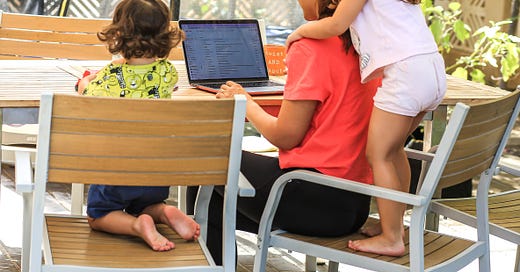AI & Our Kids: Preparing for a Future We Can’t Predict
On the future of work and what history has taught us
Every time a disruptive technology emerges, fears of job loss follow.
But history has consistently proven that while some jobs disappear, new and often better jobs emerge.
From the Industrial Revolution to the rise of electricity, automation, and the internet, each technological leap caused worry—but also opportunity.
AI is no different.
It will change the job market, but if history is any guide, it will also create new careers, industries, and ways of working.
Lessons from history:
(1760s-1840s) The Industrial Revolution: Machines replaced manual labour, but the factory system created millions of jobs in new industries.
(Late 1800 - early 1900) Electricity: Eliminated some labour-intensive roles but led to the rise of electricians, engineers, and entire new industries.
(1950s - 2000) Computers and the Internet: While disrupting the retail and publishing industry, they created jobs in digital marketing, e-commerce, cybersecurity to name a few.
(1950-present; dramatic development 2022 with generative AI): Artificial Intelligence: It will automate routine tasks, but new AI-driven roles will emerge—just as they always have.
The Bigger Question: How do we prepare our kids for an AI-first world?
As a mother of two small children, I think about this a lot.
What we call “work” today, will not likely be “work” tomorrow.
The World Economic Forum 2025 Future of Jobs report predicts AI and tech will create 170 million jobs while displacing 92 million by 2030.
What skills will our kids need? How do we ensure they thrive in a world where AI is embedded in every industry?
Here are some of the common thoughts I hear on this topic:
I want to prepare my kids for the future, but how am I supposed to do that when I can barely keep up with the present? What do they need to know and understand about this new tech world.
Our education system is designed to teach humans how to absorb, contain, and regurgitate information because our ability to do so is valuable. With adaptive thinking machines, what should the next stage of human value look like?
AI is developing too fast without enough safeguards, leading to concerns about deepfakes, misinformation, privacy breaches, and biased decision-making. When it comes to kids, fears are heightened—what happens when AI influences their learning, social interactions, and even their sense of reality? How do we protect them from AI-driven risks while also ensuring they are equipped to use it responsibly?
This week I am hosting a conversation on this, with insights from leaders deep in this space: David Mattin, Sinead Bovell, Sabba Quidwai, Sal Khan to name a few.
If this interests you, please join me!
Conversation details:
📅 Date & Time: March 6, 10-11am (Dubai time) + replay will be sent if you cannot attend live
📍 Location: Online - Zoom (free)
History teaches us that change = opportunity. Our role is to equip the next generation with the mindset and skills to lead in this new world.
If you’ve been thinking about this and are open to having a healthy, constructive and optimistic conversation about it, I’d love to see you there.
Abha





Love this Abha! So important to future-proof the next generation